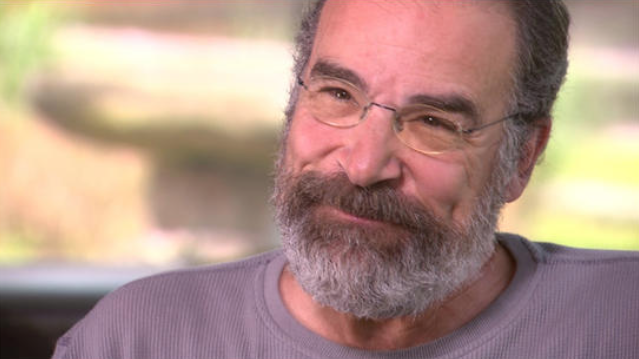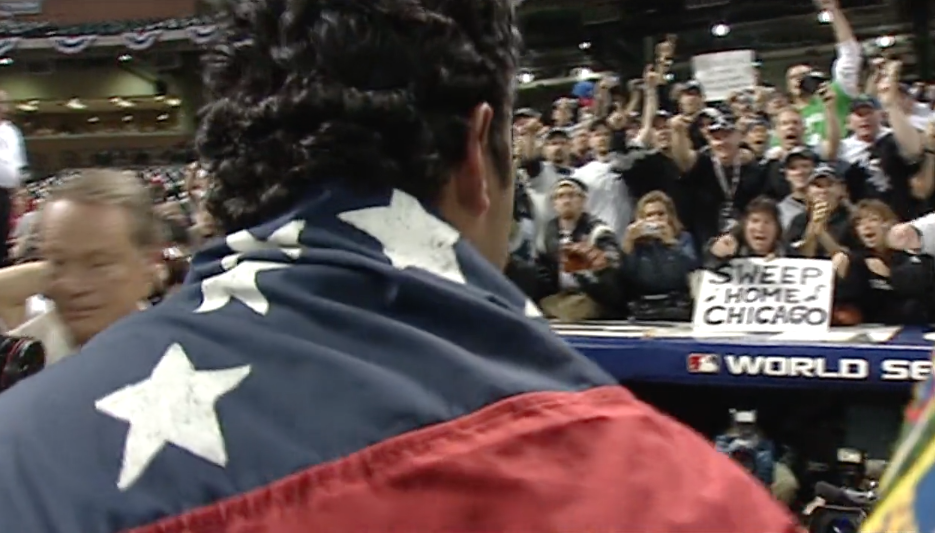Comcast SportsNet Chicago will celebrate the 10th anniversary of the 2005 World Series Championship season of the Chicago White Sox with the debut of an original 90-minute documentary.
“Believe: The Story of the 2005 Chicago White Sox,” featuring interviews with players, coaches, execs and others whose lives were touched by the city’s first Major League Baseball championship in 88 years, will premiere at 7 p.m. April 12 on the regional sports network.
Actor Mandy Patinkin, a South Side native and lifelong White Sox fan, will narrate the documentary, produced by Comcast SportsNet’s Sarah Lauch and Ryan McGuffey.
“The 2005 White Sox championship had such a deep, monumental effect on the lives of so many fans due to its personal impact and this story truly showcases the moments leading up to the celebration that will live on for generations to come,” Kevin Cross, senior director of news and original content for Comcast SportsNet, said in a statement. “We are excited to tell this amazing story of determination, as we will hear the stories and first-hand, behind-the-scenes experiences that have never been told before on camera until now.”
Following its premiere April 12, “Believe: The Story of the 2005 Chicago White Sox” will be repeated at 3:30 p.m. April 17 and at 3:30 p.m. April 19.
Here, according to Comcast SportsNet, are excerpts from the documentary:
KENNY WILLIAMS on revamping the roster after the Minnesota Twins clinched the AL Central for the third-straight season in 2004: “The Minnesota Twins taught us the most valuable lesson …as a matter of fact, I don’t think we win the ’05 World Series without the lessons that the Twins taught us…that’s when they publicly stated ‘that team over there is better than us, has more talent than we do, but they are not going to beat us.’ We really had to look within ourselves to figure out what, what does that mean?”
JON GARLAND on the White Sox being picked to finish 4th in the AL Central in 2005: “I can remember a conversation with (Paul) Konerko. We got done in spring training one day and we were sitting outside, both waiting for a ride home. The poll had come out and we were picked to come in fourth in the division. We just sat there and kind of laughed because we looked around our clubhouse and saw some of the guys that came in. We had Jermaine (Dye) come in, we had Scotty (Podsednik) come in, A.J. (Pierzynski) came in. We didn’t really quite know, but we knew we had the talent. We were just sitting there and talked about it and we just kind of laughed about it and we were both like ‘you know what?...this might be the greatest thing possible for us.”
A.J. PIERZYNSKI on how "Don’t Stop Believin’ " became the team anthem: “It was random. I think it was the hotel bar in Baltimore and they had a lounge singer and a guy playing the piano. (Joe) Crede and (Aaron) Rowand and I were just in there goofing around after a game and I think Crede yelled out ‘Play some Journey!’ and the guy was like ‘I don’t know anything like that.’ And then, the next day in Baltimore, we were losing and they played ‘Don’t Stop Believin’ and Crede again yells and we were all like ‘Play some Journey!’ We came back and scored and won the game. Then it just seemed like we would go to different places and they would play that song and we’d always be like ‘Play some Journey!’ and then we would always come back and win the game.”
JOE CREDE on the surging Indians: “At the time, I’m thinking ‘we’re not going to the playoffs, we’re just going to blow this lead right here,’ but that just showed the character of the team. Just that year, everything seemed to fall into place. It was just a magical year and it was meant to be…luck was on our side and it just seemed like once we got over that hump towards the end and got into the playoffs, it just seemed like ‘alright, it’s meant to be.”
OZZIE GUILLEN on the Orlando “El Duque” Hernandez game – Game 3 of ALDS (Red Sox had bases loaded with no outs, trailing 4-3 in the sixth inning, when Hernandez entered the game in relief): “I told (bench coach) Joey Cora, ‘this is it…this is what will take the team to the next level.’ I asked ‘El Duque’ and said ‘how you do that?...what went through your mind? You know what Duque told me? He said ‘everybody wants to be a hero in that time…everybody wants to swing 3-2…they want to be the hero…and I got them. Experience.”
OZZIE GUILLEN on the dropped third strike scenario involving A.J. Pierzynski in Game 2 of the ALCS: “That call could go either way. What happened with that time, baseball gods were with the White Sox and we had the smartest guy on the field at that particular time. It’s funny. When I saw A.J. running, I said ‘here we go, A.J.’s being stupid again.’ A.J. was always doing something to make you very upset. When he turned, I thought he was going to fight with the (catcher) and he kept running. I thought ‘aw, he’s going to make a fool of himself in the playoffs, come on, what are you doing?!’ All of a sudden, things stopped…safe…and it’s like “okay, what just happened?!”
MIKE SCIOSCIA on the dropped third strike scenario involving A.J. Pierzynski in Game 2 of the ALCS: “Well, my opinion on it hasn’t changed. It was a horrible call. That play didn’t win or lose the game or series for us. We had a lot of opportunities. To say that one play was something that cost us the series, I disagreed with that then, I still disagree with that now, but I do think that it was one of the worst calls that I’ve ever seen and it is what it is.”
A.J. PIERZYNSKI on the dropped third strike: “(The ball) hit the ground. The umpire said it hit the ground, but I didn’t really care to be honest. I just ran because I thought it hit the ground and when I took a step and he didn’t tag me, I just remember that I ran and they called me safe. Thing is (Mike) Scioscia is right, it didn’t win or lose the series for us. (Angels pitcher) John Lackey was like ‘you guys were going to win no matter what, your pitching was better and you guys threw four complete games…that’s what won the series, not that one play.”
PAUL KONERKO on his Game 2 World Series grand slam: “This place was…I mean, I’ve played a lot of games here and I’ve never seen anything like what was going on in the stadium after that. I knew when I was out there at first, throwing ground balls, then we finished up the ground balls, and you step back to your position…but it’s the postseason, so the commercials are long and you have to wait. Just to look around, I knew this is like ‘I’ll remember this…this is a pretty cool thing.”
SCOTT PODSEDNIK on his Game 2 World Series walk-off home run: “I got all of it. I hit it as good as I could hit it. It was cold and rainy that night and the ball wasn’t travelling great, so I knew I had got enough of it to at least get it to the wall. I really wasn’t thinking about if it was going to leave or not. I was thinking three (bases), at least two, and right before I saw (White Sox first base coach) Tim Raines throw his hands up, I looked up to right center and saw it leave. I’m getting chills reliving it.”
BOBBY JENKS on being the pitcher for the final out of a World Series win: “It’s like a silence that comes over you…everything goes numb. You’re in this moment where you know what just happened, but you don’t want to believe it just happened…that it’s actually over, but you know it’s real at the same time. You can hear in the background this fading…everybody…the excitement, but there’s the silence over you. It’s almost like a build-up and everyone starts collecting on the mound and it’s just a giant roar…it’s an incredible feeling.”
KENNY WILLIAMS on the final out: “For me, it was a deep breath and then my attention went right to Jerry (Reinsdorf) and I think I watched him from the time of the last pitch to the time we went down to the tunnels. I watched him because he was…he was like a little kid, and I promised him we’re going to get this done. So to see that come to fruition and to see he and his family, how they celebrated and the weight I think finally being off him, it was just very gratifying…beyond gratifying…I don’t have a word to describe that.”
JERRY REINSDORF on his raw emotion of the final out: “It was a deep breath, that’s what it was. Even up three games to nothing, it could happen. The year before, the Red Sox had come back from three nothing. It could happen. For a moment, it was a feeling of disbelief. The Chicago White Sox have won the World Series after 88 years?! It was amazing. It was just an amazing feeling and we were all up, all night long, celebrating.”
OZZIE GUILLEN on when he truly realized they won the World Series: “I hate to fly. I don’t like to fly and I fly every other day. Coming down to Chicago, the (flight) captain always wanted me to come and see the landing. I ain’t going to do that! My family is here now! So, we were landing and the captain called one of the stewardesses and said ‘just bring Ozzie…just to see this.’ He flew around Midway Airport and I saw the line and I saw the people in the street. Then I just…then I couldn’t stop crying…that was when I realized what we did.”
PAUL KONERKO on when he decided to give the final out World Series ball to Jerry Reinsdorf at the downtown parade/rally: “Probably sometime after Game 3. Again, you don’t want to start thinking ahead because it seems like in sports and in baseball, every time you’re like ‘we’re going to win this game,’ then it doesn’t happen. So, you try to keep your thoughts away from those things, but I certainly knew before Game 4. I’d given (the final ball) to the starting pitcher in the divisional series clincher and the ALCS, so those had all gone to the winning pitcher of those games. But, I knew for that one, it should go to Jerry.”
JERRY REINSDORF on receiving the final out World Series ball from Konerko: “I almost lost it when he gave me the ball, it was never on my mind. Then, when he called me up and gave me the ball, I really came very, very close to being overly emotional. I was emotional enough as it was. If you take out the birth of children and getting married, certainly, yeah, that was my number one moment with the White Sox. Baseball is the one sport that ties generations together. We were able to give everybody that wonderful feeling. That was the best part of it.”
PAUL KONERKO on the legacy of being a part of the first team in Chicago to win a World Series in 88 years: “It’s probably a good thing we didn’t know how much was at stake for people around here because we might have played tight. We might not have done it. You’re talking about serious things with people dying and families and all these things that made the connections with them…their fathers and their mothers…it’s pretty heavy stuff. I’m definitely proud that I was on that team. Everybody on that team will always have that place here. It could be 50 years from now, 100 years from now, but that team is the first one that brought it back after that many years.”





